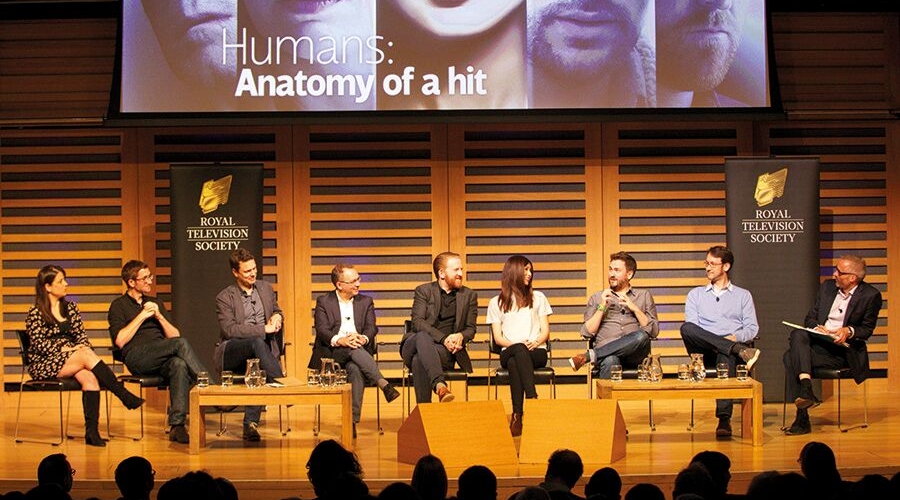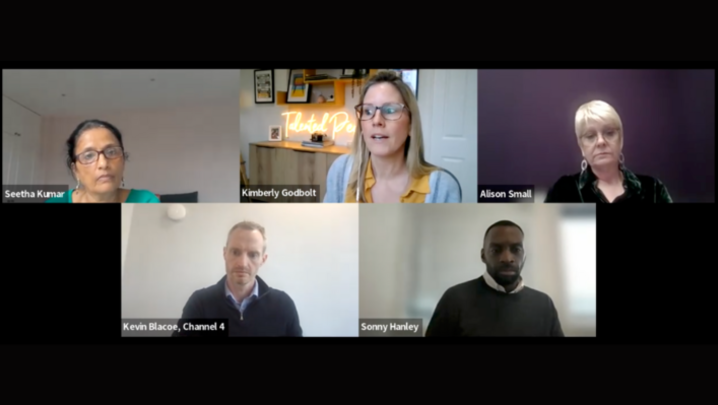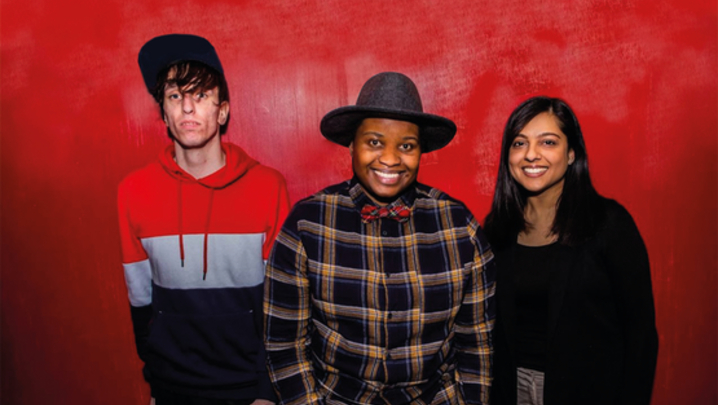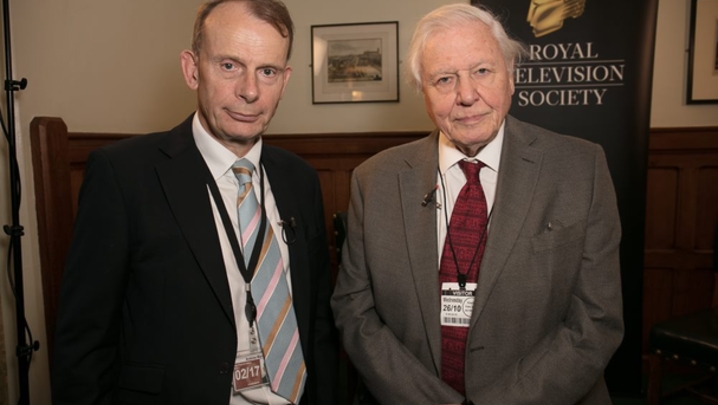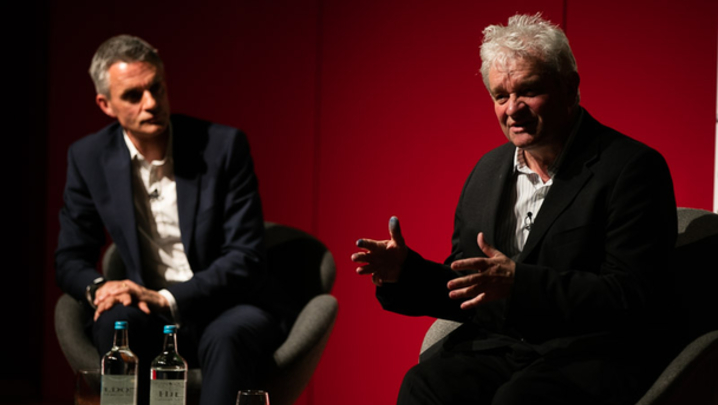The stars, writers and producers of Humans explain how the hit drama was nurtured for the small screen.
It seems that every successful television show needs a degree of serendipity. As we discovered during the latest RTS “Anatomy of a hit” session, Channel 4’s surprise summer hit, Humans, was no exception.
The British producer, Kudos, famous for Spooks, Life on Mars and Broadchurch, got lucky when it got into bed with AMC, the US cable channel equally famous for Mad Men and Breaking Bad.
Kudos got luckier still when it cast Gemma Chan as the implausibly pretty synth, Anita/Mia, purchased to restore equilibrium to the Hawkins household, but whose arrival only adds to the domestic dysfunction.
Based on the award-winning Swedish drama, Real Humans, executives at Kudos explained to the RTS audience how the show, Channel 4’s most popular drama for 20 years, reached the screen.
A three-minute teaser was enough to start pulses racing at Kudos, recalled Humans Executive Producer, Derek Wax. “It was so original that we decided we wanted to option it,” he said. “We swooped and did a deal with Matador [the Swedish producer].
“We went to Sweden and talked to them about how they had made the show. We took their original idea and then Jon and Sam [writers Jonathan Brackley and Sam Vincent, who’d worked on Spooks] created different story strands and a different psychological dimension within those characters and the story. I think that’s what made it an original show.”
He added: “It probably took eight to nine months between seeing the original tape and Channel 4 commissioning Humans.…
“We wanted to take the original show to a different level. I am not saying our show is better than theirs, it is just a different show because we felt there was more to explore in the family dynamic.”
For Brackley and Vincent, used to writing taut, exciting scripts for Spooks, it was important to ground the show in humdrum reality, regardless of the fantasy element.
The audience was played a clip from Humans’s opening episode, in which Joe Hawkins [played by Tom Goodman-Hill] takes daughter Sophie to the store that sells synths, where he is first introduced to android Anita and her robotic charms.
“It was important to get the balance between the eerie, unsettling side of it and the banality, the everydayness, of it,” explained Vincent.
“That is why the salesman’s dialogue is very colloquial. We were thinking about the Apple Store. It is a very sleek, modern place but what goes on there is actually very everyday.
“You don’t want to overplay the spookiness. You want it to feel real.… It was important for us to get that right and to feel that it was just a family purchasing a piece of very hi-tech consumer technology.”
This determination to anchor Humans in today’s world and reflect contemporary concerns was one reason for its extraordinary success, the panellists suggested.
“That’s probably the key to the show’s popularity. It charmed the viewers. It is a very domestic way in to what could be seen as a science-fiction show,” said Brackley.
“It is a science-fiction show, but the balance between the domestic aspect and seeing how the family deal with their new technology brought in a broader and wider audience.”
Channel 4’s Deputy Head of Drama, Beth Willis, agreed. She highlighted the character of working mother Laura Hawkins, a lawyer juggling the demands of bringing up three children, domestic chores and life at the office.
Willis said: “The key thing for us was that, at the heart of it, it was about life, about motherhood and being a family.
“Laura tries to look after her family and keep it together.... It speaks to what every working mother feels, which is her perpetual guilt and terror that they are not doing anything good enough.
“Despite the fact that it was very sci-fi, it felt very human to me.… If I had to guess why it worked, it would be the central guilt and worry that we all feel about family and work and home.”
Finding the right co-producer for a high-profile TV drama is rarely straightforward. Originally, Xbox was to partner on Humans, but when, in the summer of 2014, the company announced that it was closing its fledgling entertainment studio, Kudos was left with a problem.
Wax took up the story: “We suddenly had to find a new partner. We talked to quite a number of potential co-producers. AMC was the one most attuned to the show that we wanted to make. In co-production, it is all about being on the same page.
“We did speak to people, who I won’t name, who wanted to make it more American.…
“They said: ‘Could they call the mum, Mom?’ And they said, ‘It’s fine setting it in Gerrards Cross but where, exactly, is Gerrards Cross?’ They wanted to include American slang, such as ‘asshole’. There was no way that we could make a hybrid show in which British characters spoke American slang.”
Chris Fry, another executive producer on Humans, praised AMC’s contribution to the series: “It was supportive and productive on notes and on the edit.”
“AMC embraced the fact that it’s a British show,” Wax stressed. “It wanted us to cast an American actor, but we wanted to cast an American actor, too. It made perfect sense that George [played by William Hurt] was American.”
Channel 4’s Head of International Drama, Simon Maxwell, said it had helped that, by the time new US production partners were being sought, Kudos and the broadcaster “had a really solid idea of what the show was. We had two great scripts – the first two episodes – and a bible of the rest of the show.
“AMC knew exactly what it was buying into.… It was a very close relationship with AMC. I don’t think we disagreed on anything. There was real editorial synergy.”
Regarding the key question of casting this ambitious drama, Kudos executives said that they had a tailwind behind them. “It came together like a dream, is the short answer,” noted Fry. “It was all based on the script.
“Every cast member who came in to audition said that these are the best and most interesting scripts we’ve ever read. Most actors probably say that [laughter from the audience], but I thought it was genuine…
“Gemma [Chan] was probably one of the first people in on the day we started casting.… She just sort of was Anita. (See below for what it’s like to play a synth.)
“I remember, after she’d done her first reading, we all sat there and none of us could think of a note. Tom, again, came in and nailed it straight away.”
Hurt, an artificial intelligence nut from boyhood, came to the show via AMC. As for the casting of the other main characters, Kudos’s US collaborator was happy to keep the star quotient low.
Wax pointed out that both Jon Hamm in Mad Men and Bryan Cranston in Breaking Bad were not Hollywood A-listers before landing these parts. He added: “It’s all about the quality of the acting. AMC wanted truthful actors and people who were right for the role.” “From the co-production point of view, casting is one of the key areas where you can have disagreements,” said Maxwell. “It was an example of how smooth the entire process was…there wasn’t one major casting disagreement.”
“We had an amazing cast,” Fry emphasised. “Not just the synths, but the incredibly emotional performances from Tom and Gemma. Throughout the series, I wanted it to feel real and truthful and not too big and heightened for the whole thing to work.”
Willis drew attention to the performance of Katherine Parkinson as Laura Hawkins, known to Channel 4 audiences for her part in The IT Crowd.
“For the channel, it’s important that the cast felt real and not too showy,” she said. “Katherine felt so natural and so real. I am so glad we had her.”
Throughout the RTS discussion, the panellists highlighted how Humans’ subject matter engaged with contemporary issues – the litmus test, perhaps, of all decent science fiction, be it Kurt Vonnegut or 2001: A Space Odyssey.
Centre stage was the role “intelligent” machines have in most of our lives and how they might eventually control us.
“At what point do our own creations start making us obsolete,” asked Maxwell. “We all invite technological gadgets into our lives, but at what cost?
“That is one of the reasons why the show proved so successful. There is fear in our relationship with technology. Because we fear it might make us obsolete, but we can’t be made obsolete because of our humanity and our capacity for love.”

(Credit: Paul Hampartsoumian)
For a series that captured millions of people’s imaginations, the drama was at its best when it was “complex and ambiguous and not too binary”, reckoned Wax. “It raised lots of ethical dilemmas and grey areas. We saw synths being abused in brothels… and welcomed into homes to make our lives easier and give us quality time. We saw the huge anger some people felt about them.”
The synths’ servility raised questions about social hierarchies. “All the way through, there are analogies to slavery. It never articulates that, but it’s the subtext of the whole series,” said Wax.
“When we have a pliant person who we own, we could do anything to them and, if we do, does that degrade our own humanity?… The whole notion of understanding the humanity of people who are in a service profession, Humans resonates with that.”
Chan added: “There are people in society who we treat as less than human. If you feel you can get away with it or you’re in a position where they can’t even talk back… should you behave that way? That was what was interesting.”
Anita’s place in the Hawkins home sets off an identity crisis in Joe. “He’s trying to be a new male and failing. He thinks a synth is going to solve the problems and allow him to reconnect with his wife,” said Tom Goodman-Hill.
“The opposite is the case and, because of this, Joe falls apart. That is at the heart of the kind of gender conversations that are happening now.”
Chan raised the question of whether it is possible to program gender into a robot. “The robot’s sense of gender comes from the way it experiences the world and how other people react to it. That gets reinforced [in the Hawkins home],” she said.
Work has already begun on a second season, due to air next year. The writers said that the aim was to notch the storylines up a gear. “You can expect most of the cast to return,” promised Vincent. “In terms of tone, we want to go deeper into the relationships between humans and synths – sexual, romantic love, platonic love.
“It is such a rich area. We want to find new ways to get new relationships, be it with new characters or new combinations of characters.
“We’re going to move the world on a little bit, the canvas is a little broader. Some time has passed, allowing the ordinary synths to integrate that bit further and become more sophisticated and more involved in the fabric of our lives.”
‘Humans: anatomy of a hit’ was an RTS event held at King’s Place, London, on 27 October. It was produced by Elena Kemp, PR Manager, Drama and Acquisitions, Channel 4, Jamie O’Neill, RTS Events Co-ordinator, and Alex Wells, Senior Communications Manager, Endemol Shine Group.
The challenge of playing a robot…
Gemma Chan: ‘I want to thank choreographer Dan O’Neill.… He was with us before we started filming to help us with the movement work.
‘The production team were clear that they didn’t want anything overtly robotic. Regarding the synth movement, they didn’t want any head cocking, but they did want something that was other than human.
‘Dan took it back to basics and said: “There has to be efficiency and economy to every movement because every movement uses up battery power.”
‘Everything had to be relearnt, from how to stand up and sit down to how to pick up a glass. The simplest things became very.… On the first day of filming, I got home and I felt my head was going to explode. Having to try and remember all the technical stuff and how many steps it was to the door, as well as trying to act in the scenes, was really, really hard.
‘I felt really jealous of the humans....On the plus side, what you do discover as an actor is the power that you have in stillness and in not giving everything away. You have to find a different way to express emotions.’
… and playing opposite a robot
Tom Goodman-Hill: ‘It was incredibly weird, especially in the early episodes, when Gemma was ostensibly playing Anita.…
‘It’s really unsettling, particularly in episodes three and four: Joe is reflected back on himself and trying to find out what Laura finds so fascinating about her and trying to find out what he finds so unsettling about her.
‘What Gemma’s really doing, which is extremely unnerving, is reflecting you back at yourself for a lot of the time.
‘Every now and again, she lets out something that is slightly quizzical or slightly human. That was then very unsettling…
‘As a family, the first big scene we did with Anita was the scene around the breakfast table.
‘We were completely freaked out because Gemma was furiously concentrating on making sure she was staying in Anita mode. It was weird because Gemma was slightly detached from us… it was really strange.’

